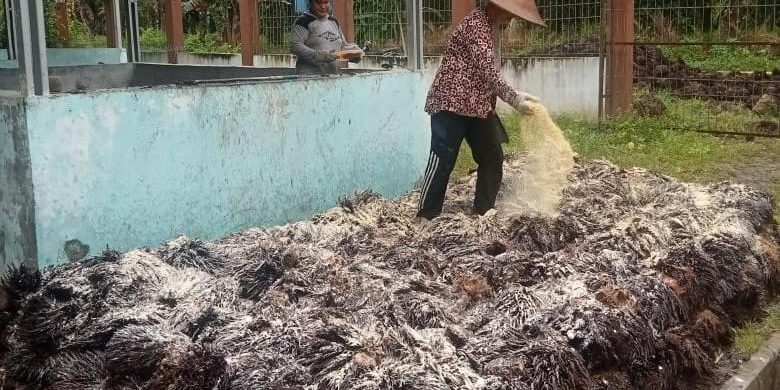In today’s market, mushrooms have become a sought-after commodity and a vital part of everyday life for many Indonesians.
Nestled in Pakava Village, Pasangkayu, West Sulawesi, the Pakava Village Mushroom cultivation business has found remarkable success by utilizing oil palm empty fruit bunches (TKKS) as a substrate for merang mushroom cultivation. These empty palm oil bunches, often overlooked as waste products from the palm oil industry, have been transformed into a thriving business opportunity by the resourceful residents of Pakava Village, conveniently located near the operations of PT Pasangkayu, a subsidiary of PT Astra Agro Lestari.
The rapid growth of this enterprise is a testament to the intensive support provided by PT Pasangkayu. The MSME (micro, small, medium enterprise) proudly markets its merang mushroom products to larger stores throughout Pasangkayu. The mushroom cultivation business has developed an exciting lineup of processed products, with their crispy mushroom chips emerging as a favorite.
Hardan, the head of the Pakava Village Mushroom MSME shares the inspiring journey of this initiative: “We received nurturing support from the very beginning, and now we have blossomed into what we are today.” PT Pasangkayu’s commitment includes material assistance and invaluable training, enabling these MSMEs to flourish in an ever-competitive market.
The innovative approach of this mushroom cultivation business has even caught the eye of the West Sulawesi Ministry of Environment (DLH). Pakava Village has been selected as the site for the Integrative Mushroom Kumbun pilot project, a unique processing initiative that is one of only four locations across Indonesia. This recognition is a significant point of pride for the local community.
PT Pasangkayu’s Corporate Social Responsibility (CSR) program continues to play a crucial role by providing ongoing training and support for locally owned business enterprises, fostering an environment ripe for entrepreneurship. Juanda Syahputra, PT Pasangkayu’s Community Development Officer, expresses a hopeful vision, stating, “We aspire for Pakava Village’s Mushroom MSME to serve as an inspiring example for other communities seeking to embark on their entrepreneurial journeys.”
Beyond merely selling raw merang mushrooms, the mushroom MSMEs of Pakava Village now boast a delightful selection of crispy mushroom chips in various flavors, along with delicious alternatives like purple sweet potato, banana, and cassava chips. This success uplifts local en positively impacts the village economy and the environment.
With accessible capital requirements, merang mushroom cultivation presents an incredible opportunity for community members to become entrepreneurs without hefty production costs. Their achievements are anchored in a commitment to consistency, patience, and hard work.
Today, the Pakava Village Mushroom MSME stands as a shining example of how harnessing local resources can create sustainable economic opportunities, proving that with creativity and determination, anything is possible!
Source: 50detik.com
Disclaimer
This article may contain copyrighted material, the use of which may not have been pre-authorized by the copyright owner. This material is made available for the purpose of giving information and knowledge. The material contained on the Astra Agro website distributed without profit. If you are interested in using copyrighted material from this material for any reason that goes beyond ‘fair use’, you must first obtain permission from the original source










